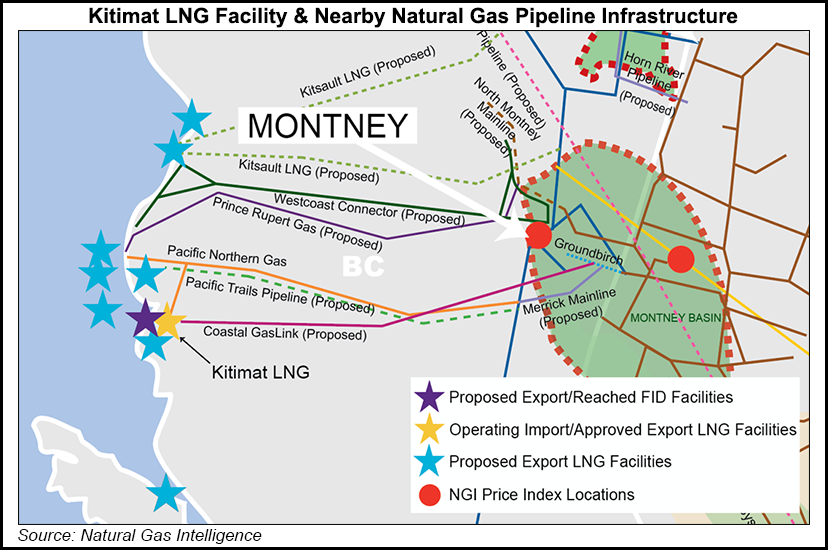NGI The Weekly Gas Market Report | Coronavirus | Infrastructure | LNG | LNG Insight | NGI All News Access
LNG Canada Construction Said On Track, Despite Covid-19
Canada’s C$40 billion ($30 billion) inaugural natural gas export project on the west coast has remained on schedule despite the global Covid-19 outbreak, project managers said in an update.

The executives overseeing the Royal Dutch Shell plc-led LNG Canada project said the British Columbia (BC) construction labor force of more than 2,000 had so far remained sealed against the pandemic. Crews of 1,200 building the liquefied natural gas (LNG) export terminal’s supply pipeline, Coastal GasLink (CGL), had also to date evaded the pandemic.
The CGL route, across 670 kilometers (400 miles) of BC woods and mountains, is remote from urban centers; BC had recorded 73 Covid-19 cases as of last weekend.
At the terminal’s more exposed Kitimat seaport site on the Pacific coast, construction managers Vince Kenny at LNG Canada and Berni Molz at contractor JGC Fluor described disease prevention precautions in a progress report.
“While we monitor the situation closely, our core construction activities remain on track,” they said. “We have launched specific hygiene campaigns across the project. These include information about effective hand washing practices and cough etiquette, and good workplace practices including the frequent cleaning of common touch points such as doorknobs, handles and tabletops.”
Travel rules were adopted early to prevent arrival of the virus from abroad, carried either by project personnel or on board freighters delivering imported LNG plant hardware and construction supplies, according to the report.
“For the past month, LNG Canada has restricted travel for staff and contractors between impacted countries and regions — including but not restricted to China, South Korea, and Italy — and the project site in Kitimat,” the project managers said.
Foreign sailors remain on their ships while at the northern BC port, and crew changes are prohibited. The only exceptions allowed are for medical or humanitarian emergencies.
The project’s other interest owners Mitsubishi Corp., PetroChina Co. and Korea Gas Corp. also resisted economic pessimism that the pandemic and the oil price war between Russia and the Organization of the Petroleum Exporting Countries would hurt the long-term prospects for the project.
“While record new supply is coming in, two successive mild winters and the coronavirus situation have depressed prices today,” said LNG Canada CEO Peter Zebedee in a project update. “However, the LNG market equilibrium is expected to return, driven by a combination of continued demand for cleaner energy and reduction in new supply coming onstream until the mid-2020s.”
Zebedee cited Shell’s recent annual global LNG forecast, which predicted demand would double to 700 million metric tons/year (91 Bcf/d) by 2040, with the project’s target Asian markets dominating the growth.
Neither the coronavirus nor prolonged native rights and environmental protests before the pandemic have eroded acceptance of the LNG export project among BC residents, according to a new poll by Vancouver-based Research Co.
The survey recorded two-to-one support, with 61% in favor of the northern development outnumbering 30% against. The poll also showed LNG Canada is supported by majorities of voters for all three BC political parties: the New Democratic Party government and the Greens and Liberals on the opposition side of the provincial legislature.
© 2024 Natural Gas Intelligence. All rights reserved.
ISSN © 1532-1231 | ISSN © 2577-9877 | ISSN © 1532-1266 |
